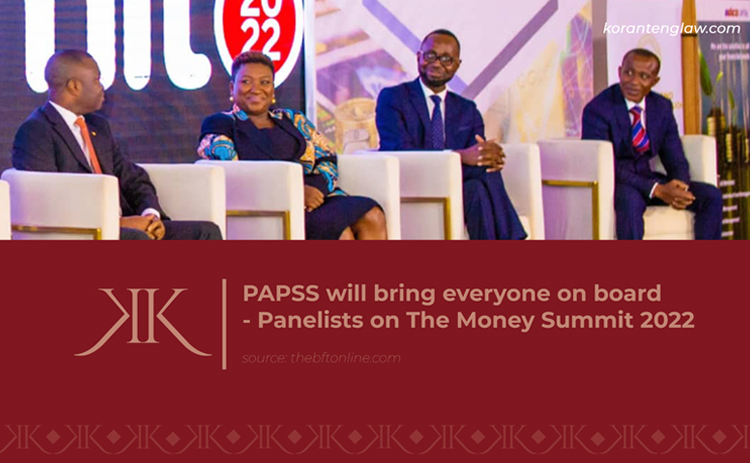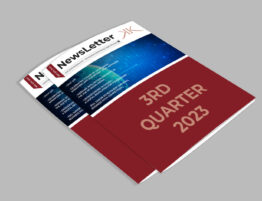
PAPSS will bring everyone on board
PAPSS will bring everyone on board
The Pan African Payment and Settlement System (PAPSS) is poised to incorporate all regulated payment and settlement outlets across participating countries into its framework, and in the process ensure that no segment of the economy is left out.
In Ghana, banks and non-bank financial institutions – including saving and loans companies, fintechs and mobile money platforms – will be able to access PAPSS through their participation on the Ghana Interbank Payment and Settlement Systems Limited (GhIPSS) platform.
This came to light at the second edition of The Money Summit organised by the B&FT, which had as its theme ‘Africa’s Economic Growth – Facilitating Investment, Payments and Settlement Systems’.
Speaking as part of the first plenary at the event, where the focus was on Africa’s Payment and Settlement System; Opportunities, Challenges, and the Way Forward, the Head of Payment Systems at BoG, Dr. Settor Amediku, explained that GhIPSS is at an advanced stage of being linked to PAPSS; adding that the move will deepen financial inclusion as businesses will be able to execute transactions through digital tools, including mobile phones.
“PAPSS will work with all regulated payment institutions in every African country. For example, in the case of Ghana, all our banks are going to be linked to the PAPSS infrastructure through GhIPSS. We have licensed fintechs, we have savings and loans companies, and we have other payment companies that are already linked with GhIPSS… with your mobile phone, you can do transactions through the PAPSS infrastructure,” he remarked.
Addressing concerns that the system could be compromised due to the shareholder composition of Afreximbank – which developed the platform, Dr. Amediku explained that the participating central banks are custodians of the payment system and remain responsible for the day-to-day running of PAPSS in accordance with its mandate.
“Afreximbank is only providing the infrastructure. It is our duty to ensure that payment and settlement systems support the economy of our respective countries. So there should be no fear that Afreximbank will dictate to us how our payment systems should be run, because this is the constitutional mandate of the member central banks,” he added.
Regulator’s pledge
Describing PAPSS as a major step in unleashing the region’s trade and investment opportunities, the Second Deputy Governor of the BoG, Elsie Addo Awadzi, in her keynote address stressed the regulator’s preparedness to be firm as a member of the Governing Council of PAPSS.
“As a member of the governing council of PAPSS, the Bank of Ghana has offered maximum support to the testing and pilot phases of the PAPSS. The BoG also continues to promote a modern, innovative, resilient and inclusive payment system in Ghana to help boost commerce and access to financial services which intend supporting Ghanaian MSMEs to plug into the AfCFTA market and beyond,” she said.
She added that the impending e-Cedi, which is backed by the apex bank’s balance sheet, will serve as a critical tool in driving an inclusive and formalised economy as the nation emerges from effects of the pandemic and Russia-Ukraine crisis.
Core function
For the Chief Financial Officer at Fidelity Bank, Attah Yeboah-Gyan, there is a need to clarify the core function of PAPSS – which is to facilitate payment for goods and services. Otherwise, he stated, the platform will be evaluated using the wrong metrics.
He explained that the system will address issues around the delays associated with transactions, cost of payment as well as the demand for forex which characterises many countries on the continent; it is no substitute for or direct remedy to problems of infrastructure, political stability, or diversity of goods and services.
“PAPSS in itself will not drive trade volumes, and that must be made clear. Trade volumes are low because we do not have economies that are diversified enough, coupled with other infrastructure, social and political factors,” he said, adding that the cost and time benefits of PAPSS might lead sovereign states to see the usefulness of a single currency and make them work faster toward the required convergence criteria.
Tokens
With the growing appeal of cryptocurrencies as a medium of cross-border payments fuelling calls for their acceptance locally, the Country Manager at AZA Finance, Nana Yaw Owusu-Banahene stated that despite these developments, PAPSS at this stage of its execution remains solely a payment rail for legal tender.
He added that there is an expanding list of firms that serve as exchange platforms where digital assets are traded, but PAPSS is currently not one of them – although, with advancements in the regulatory space, it could be used as a vehicle for payment for these tokenised assets. “PAPSS is not built as an exchange for tokenised assets; there are other dedicated firms offering other services,” he said.
On a similar tangent, with innovations around Central Bank Digital Currencies (CBDCs) for cross-border payments, as in the case of the multinational mBridge project that serves Hong Kong, China, Thailand and the United Arab Emirates, Mr. Banahene said he expects to see similar developments, particularly between pioneers on the continent – Ghana and Nigeria.
Chief Executive Officer of the Ghana Investment Promotion Centre (GIPC), Yofi Grant, argued that operators of PAPSS must take notice of advances in digital and decentralised finance.
AML/CTF
For Managing Partner at Koranteng & Koranteng Legal Advisors, Afua Adubea Koranteng, existing due diligence frameworks of participating central banks, as well as the presence of MANSA – the reference Africa customer due diligence repository platform, will ensure that PAPSS is not used as a conduit for illicit funds and participating countries will not fall foul of the Financial Action Task Force (FAFT) stipulations.
“Before a trade is begun, much due diligence will have to be done by the institution initiating the transaction; and with the BoG being very active, I do not think we will be in a situation where any regulator will be trigger-happy with sanctions,” she explained.
The National Identification Card, otherwise known as the Ghana Card, was lauded for its role in advancing know your customer and due diligence compliance.
On his part, the Head of Product Management at Hubtel, Patrick Asare-Frimpong, called for increased collaboration among parties within the pan-African payment and settlement ecosystem.
The Head of Product and Business Development at PAPSS, Monica Oraro who joined in virtually, highlighted the preparedness of the platform’s operators to ensure it fulfils the purpose for which it was designed.
source: thebftonline.com








